

The Right To Be Forgotten. Posted by Tara Taubman-Bassirian on March 18, 2015.
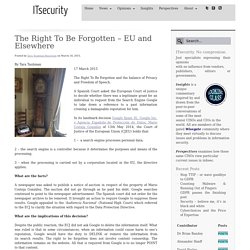
By Tara Taubman 17 March 2015 The Right To Be Forgotten and the balance of Privacy and Freedom of Speech. A Spanish Court asked the European Court of justice to decide whether there was a legitimate grant for an individual to request from the Search Engine Google to take down a reference to a past information creating a damageable reputation for him. In its landmark decision Google Spain SL, Google Inc. v Agencia Española de Protección de Datos, Mario Costeja González of 13th May 2014, the Court of Justice of the European Union (CJEU) holds that: 1 – a search engine processes personal data; Debate: Should The U.S. Adopt The 'Right To Be Forgotten' Online? Jonathan Zittrain, co-founder of the Berkman Center for Internet and Society, says the right to be forgotten online is "a very bad solution to a real problem.
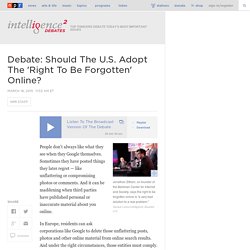
" Samuel Lahoz/Intelligence Squared U.S. Hide caption itoggle caption Samuel Lahoz/Intelligence Squared U.S. Google Spain v. González: Did the Court Forget About Freedom of Expression? by Stefan Kulk, Frederik J. Zuiderveen Borgesius. Stefan Kulk Utrecht University - Centre for Intellectual Property Law; Utrecht University School of Law (the Netherlands) Frederik J.
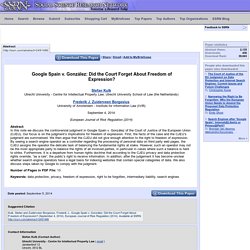
Zuiderveen Borgesius University of Amsterdam - Institute for Information Law (IViR)September 4, 2014 European Journal of Risk Regulation (2014) Abstract: The right to be forgotten from Google? Forget it, says U.S. crowd. The University of Oklahoma expelled two fraternity members this week after video of them leading a racist chant went viral.
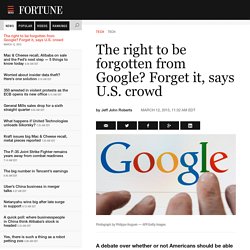
EDPL - European Data Protection Law Review. Debate about the right to be forgotten. You can watch a debate about the right to be forgotten between me and Paul Nemitz (pro) and Jonathan Zittrian and Andrew McLaughlin (con) here.
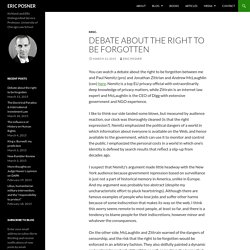
Nemitz is a top EU privacy official with extraordinarily deep knowledge of privacy matters, while Zittrain is an internet law expert and McLaughlin is the CEO of Digg with extensive government and NGO experience. I like to think our side landed some blows, but measured by audience reaction, our clock was thoroughly cleaned (is that the right expression?). Nemitz emphasized the political dangers of a world in which information about everyone is available on the Web, and hence available to the government, which can use it to monitor and control the public. I emphasized the personal costs in a world in which one’s identity is defined by search results that reflect a slip-up from decades ago. The bottom line is that in America (unlike in Europe), even in the upper west side of New York, people trust corporations more than they trust the government. The Right-to-be-Forgotten, Sandeep Kumar and the Oxford Mail.
Following Tara’s article on the right-to-be-forgotten (The Right To Be Forgotten – EU and Elsewhere) there was an interesting comment on Twitter: The headline to this article in the Oxford Mail reads: Google wipes out stories about Asbo yob Sandeep Kumar under Right to be Forgotten ruling.
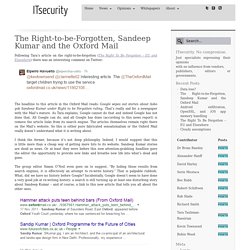
That’s really sad for a newspaper with the Mail’s stature. As Tara explains, Google cannot do that and indeed Google has not done that. All Google can do, and all Google has done (according to this news report) is remove the article links from its search engine. Google: Two RTBF cases in CJEU could alter privacy-public interest balance.
G has to delete search results. Right to be forgotten UK. Right to be forgotten in France. Right to Delete. Right to be forgotten in Japan. US vs EU. Right to be forgotten in the US. Right to remember. Italy The right to oblivion. Art 29 WP. Max Mosley. Dutch rulings. Right to be forgotten in Germany. Centre for Media Pluralism and Media Freedom (CMP... CPDP 2015: The right to be forgotten. European and international perspectives. Internet privacy - the right to be forgotten. Right to Be Forgotten: A Win for Argentina’s Lawsuit-Happy Celebrities? Argentine model Belen Rodriguez, who sued Google Argentina in landmark defamation case.

Photo by Manuela Capitanucci via Wikimedia Commons (CC BY-SA 2.0) Since the EU Court of Justice ruled to uphold and codify the Right to Be Forgotten last May, Google has received over 91,000 requests for removals, roughly half of which were granted. Free expression activists fear that the decision will open the door for corporate and government powers to remove unsavory information about themselves from search results. And the fact that it will be incumbent on tech companies like Google and Yahoo to make these decisions is no small matter — taking this decision out of the hands of the judiciary is a serious blunder in the field of online rights. Are you familiar with EU case on the “right to be forgotten”? Yes, I am. The European Court has not provided clear definitions of when the RTBF will apply and when a public interest analysis will prevail.
There has not been, so far, a RTBF case in Argentina. Watch "On the right to be forgotten. A Question Over the Reach of Europe's 'Right to Be Forgotten' Internet & Jurisdiction Project – A global multi-stakeholder dialogue process. Technology. European data regulators are set to instruct Google to apply “right to be forgotten” search result deletions outside of Europe on Google.com.
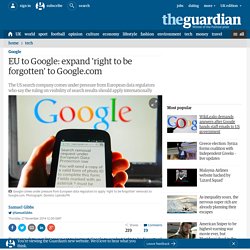
The Article 29 cross-European panel of data protection watchdogs announced its guidance that search result removals should be carried out beyond local European domains such as google.co.uk, google.fr and google.de to prevent circumvention of the right to be forgotten law. “De-listing decisions must be implemented in such a way that they guarantee the effective and complete protection of data subjects’ rights and that EU law cannot be circumvented,” Article 29 said in a statement. Terrorists using Google's 'right to be forgotten' to cover-up trials. Law allows EU citizens to ask for links to be removed from Google search Sajid Javid accuses unelected judges of restricting media freedomGoogle has received nearly 500,000 requests to remove linksCulture Secretary questions whether domination of BBC website By Matt Chorley, Political Editor for MailOnline Published: 13:37 GMT, 11 November 2014 | Updated: 23:06 GMT, 11 November 2014.

Right to be forgotten poses more questions than answers. Some expected a grand finale, a denouement in which the problems raised by the ruling of the European court of justice against Google on the so-called “right to be forgotten” would be resolved.
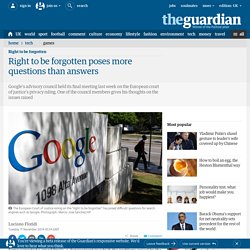
Instead, a sense of deja vu soon dawned on the final meeting in Brussels, as no new ideas emerged and many of the comments already made in previous meetings were reiterated. For once, we had more time for questions than questions to ask. Perhaps this was inevitable - or perhaps it was a missed opportunity to run some intellectual risks and think outside the proverbial box. EU official criticizes Google meetings on right to be forgotten ruling. Do negative reviews have a right to be forgotten by Google? Anyway, Lazic’s confidence is surely misplaced. The ruling specifically applies to search engines, not to originators of material that was "lawfully published". So Mr Lazic should be complaining to Google, Yahoo, et al., not the Washington Post. Internet & Jurisdiction Project – A global multi-stakeholder dialogue process. I&J Project Director Bertrand de La Chapelle was invited to share the insights generated by the I&J Project’s global multi-stakeholder dialogue process and the emerging transnational due process draft framework with the Advisory Council that Google set up to guide the implementation of the Court of Justice of the European Union ruling on the right to be de-indexed.
The hearing took place on September 25, 2014 in Paris, France. The contribution of Bertrand de La Chapelle starts at 3 hours and 31 minutes. The right to be forgotten - between expectations and practice. The Right To Be Forgotten: Protecting Digital Privacy.